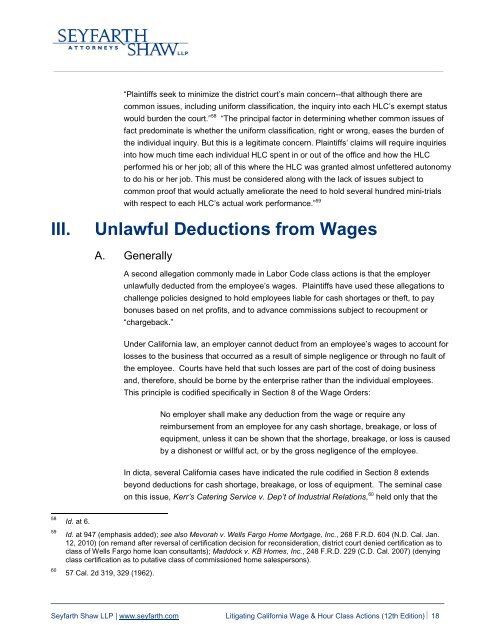Litigating California Wage & Hour and Labor Code Class Actions
Litigating California Wage & Hour and Labor Code Class Actions
Litigating California Wage & Hour and Labor Code Class Actions
Create successful ePaper yourself
Turn your PDF publications into a flip-book with our unique Google optimized e-Paper software.
“Plaintiffs seek to minimize the district court’s main concern--that although there are<br />
common issues, including uniform classification, the inquiry into each HLC’s exempt status<br />
would burden the court.” 58 “The principal factor in determining whether common issues of<br />
fact predominate is whether the uniform classification, right or wrong, eases the burden of<br />
the individual inquiry. But this is a legitimate concern. Plaintiffs’ claims will require inquiries<br />
into how much time each individual HLC spent in or out of the office <strong>and</strong> how the HLC<br />
performed his or her job; all of this where the HLC was granted almost unfettered autonomy<br />
to do his or her job. This must be considered along with the lack of issues subject to<br />
common proof that would actually ameliorate the need to hold several hundred mini-trials<br />
with respect to each HLC’s actual work performance.” 59<br />
III.<br />
Unlawful Deductions from <strong>Wage</strong>s<br />
A. Generally<br />
A second allegation commonly made in <strong>Labor</strong> <strong>Code</strong> class actions is that the employer<br />
unlawfully deducted from the employee’s wages. Plaintiffs have used these allegations to<br />
challenge policies designed to hold employees liable for cash shortages or theft, to pay<br />
bonuses based on net profits, <strong>and</strong> to advance commissions subject to recoupment or<br />
“chargeback.”<br />
Under <strong>California</strong> law, an employer cannot deduct from an employee’s wages to account for<br />
losses to the business that occurred as a result of simple negligence or through no fault of<br />
the employee. Courts have held that such losses are part of the cost of doing business<br />
<strong>and</strong>, therefore, should be borne by the enterprise rather than the individual employees.<br />
This principle is codified specifically in Section 8 of the <strong>Wage</strong> Orders:<br />
No employer shall make any deduction from the wage or require any<br />
reimbursement from an employee for any cash shortage, breakage, or loss of<br />
equipment, unless it can be shown that the shortage, breakage, or loss is caused<br />
by a dishonest or willful act, or by the gross negligence of the employee.<br />
In dicta, several <strong>California</strong> cases have indicated the rule codified in Section 8 extends<br />
beyond deductions for cash shortage, breakage, or loss of equipment. The seminal case<br />
on this issue, Kerr’s Catering Service v. Dep’t of Industrial Relations, 60 held only that the<br />
58<br />
59<br />
60<br />
Id. at 6.<br />
Id. at 947 (emphasis added); see also Mevorah v. Wells Fargo Home Mortgage, Inc., 268 F.R.D. 604 (N.D. Cal. Jan.<br />
12, 2010) (on rem<strong>and</strong> after reversal of certification decision for reconsideration, district court denied certification as to<br />
class of Wells Fargo home loan consultants); Maddock v. KB Homes, Inc., 248 F.R.D. 229 (C.D. Cal. 2007) (denying<br />
class certification as to putative class of commissioned home salespersons).<br />
57 Cal. 2d 319, 329 (1962).<br />
Seyfarth Shaw LLP | www.seyfarth.com <strong>Litigating</strong> <strong>California</strong> <strong>Wage</strong> & <strong>Hour</strong> <strong>Class</strong> <strong>Actions</strong> (12th Edition) 18
















